
Dragon Quest XI S: Echoes of an Elusive Age Definitive Edition - PlayStation 4 Review
I’ve discovered that calling a role-playing game “perfect” is one of the most contentious forms of subjectivity. When someone hears this, it's only natural to approach said game themselves with an especially critical eye. I fit into that camp when I heard of Dragon Quest XI, wondering why all my friends who had imported it back in 2017 said it was one of the greatest games they’ve ever played. I was a casual fan of the series at the time, starting with Dragon Quest V but never finishing it. I bought the seventh and eighth game when they came to 3DS, but didn't immediately click with them. Each of those games I played hasn’t changed since then, but I realize now I didn’t look at them from quite the proper perspective. I never bothered trying to look past the “traditional” style that many people say is a detriment. Personally, Dragon Quest XI did more than be a magnificent RPG on its own, it made me fall in love with what is now one of my favorite video game franchises.
This isn’t our first review of Dragon Quest XI, or even Dragon Quest XI S. Our own Elizabeth Henges and Chao Min Wu reviewed the original PlayStation 4 release and the improved Switch release respectively. These reviews are great, and you should read them. Both gave the game a perfect score, and after reaching the credits myself earlier this year I couldn’t agree more. It would have been monumentally easy to phone in a simple review of this improved port; It would have saved both myself as a writer and yourself as a reader a lot of time, but I love this game too much to not want to talk about it in depth. I will not let you ignore the potentially final release of one of the greatest role-playing games of the last console generation. Dragon Quest XI is simply too wonderful to not gush about. It made me spend this year ravenously devouring any Dragon Quest game I could get my hands on, which is most of them.
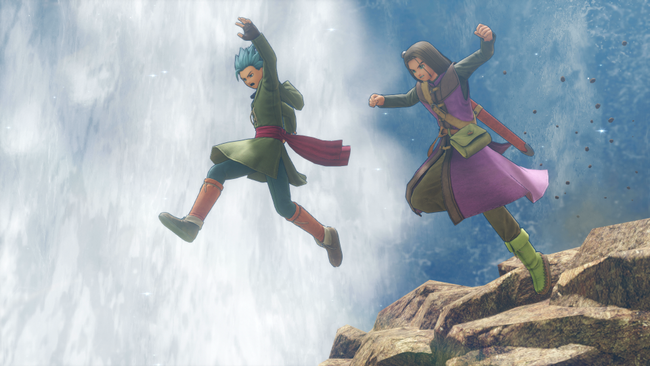
Let’s get this out of the way early. Dragon Quest XI S: Echoes of an Elusive Age Definitive Edition on PlayStation 4, Xbox One, and PC are the best ports of the best version of Dragon Quest XI. In my time playing it on PS4, I have enjoyed revisiting the previously portable rendition of the game I fell madly in love with, but now in a beautiful 1080p at 60 frames per second. I played it on my PlayStation 5, and mention this only to say that at this moment there were no significant visual improvements that stood out to me. However, that didn't stop me from loving every second of the great improvement to load times thanks to the console’s SSD. All of the great quality of life mechanics, a new Japanese voice acting option, the option for orchestrated music, and new story content have all been carried over to this version of the game.
The visuals technically aren’t as nice as they were in the original PS4 and PC version, since it is based on the Switch release, but I would hardly knock the game for this. Not only does the new content and improvements invalidate the original (already amazing) game, but the visuals no longer feel like a noticeable downgrade thanks to an increase in resolution. I first played this game to completion almost entirely on my Nintendo Switch Lite, and it still looked beautiful thanks to its timeless aesthetic. The new buttery smooth framerate combined with that crisp resolution and the ability to make battles play out faster than they did on the original PS4 version, made me feel right at home.
This home Yuji Horii seemingly has built just for me would be nothing without the foundation of a good story. Dragon Quest games are sometimes disregarded as having overly simplistic narratives, but I would argue that since the monumental third entry the plots have always been deceptively simple.
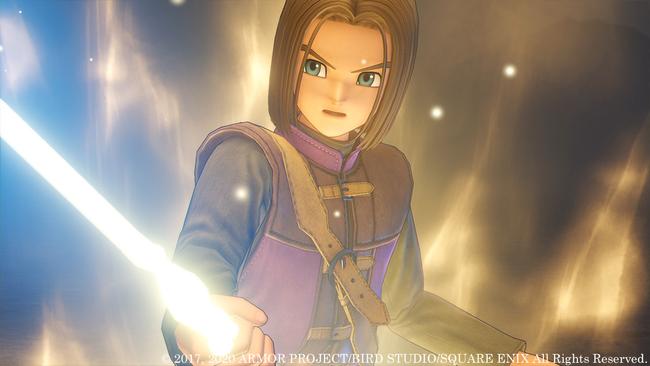
You play as a young man who learns that he is the reincarnation of The Luminary, a legendary hero who is destined to save the world from a great evil. He travels the world recruiting a party of wonderfully diverse and interesting characters like any fantasy RPG protagonist would do.
See? It seems painfully cliche, but Dragon Quest XI overcomes this label due to excellent pacing and clever subversion of expectations from the outset. Every time you think the game seems like it is starting to fall back on traditional RPG tropes, it’ll find a way to surprise you. I’m not going to talk about any of the concrete details to avoid spoilers, but the story that plays out in this 80+ hour adventure is one of the best I’ve ever experienced. I cried, I laughed, and I fell madly in love with the main cast and their journey. Every single character in the main party fits together and grows a natural relationship with one another. Even the Luminary, a silent protagonist that can only respond to questions with “Yes” or “No”, is given enough expression to feel like his own character. He works so much better than he has any right to.
They all have something in their pasts that hold them back from moving on with their lives, but overcome this by the bonds they form together. The “S” release also adds new story episodes that irons out or straight up fixes a few underwhelming character arcs from the original release. This wonderful cast is accented by stellar voice acting in both English and Japanese, but I have a soft spot for the English voice track. It's up there with the first Xenoblade Chronicles as some of the finest English voice acting in the industry, with an excellent localization to match.
Previous Dragon Quest games aimed for subtle themes and storytelling, and Dragon Quest XI applies this style in a more modern way. There are a handful of core themes that flow through the entirety of the plot, and they bring out a surprising amount of depth. Just when you think you are taking comfort in understanding where the plot is going, Yuji Horii will be waiting around the next corner to shatter your vulnerable heart. The storyline amazed me in the directions it takes, and it works beautifully with the framework of a role-playing game. If anything, I'd argue that Dragon Quest XI's story could only be told in an RPG. It has probably one of the best endings I’ve seen, and to this day I still find it incredibly thought-provoking. On this new playthrough, my adoration has only been cemented, as I’ve been able to notice the brilliant foreshadowing sprinkled throughout the game.
It takes almost every core concept that made the series so beloved in the past, and introduced them to a new generation of players in a more digestible manner. You do not need to play any previous Dragon Quest titles to love XI, but playing previous titles will make you love XI by just a bit more. A counterpoint to that would be that playing Dragon Quest XI as your entry point to the series will do a great job in making you fall in love with Dragon Quest.
I’m going to make a bold statement. Dragon Quest XI loves Dragon Quest more than Japan does. Since the release of the first game, Dragon Quest has been an important cultural phenomenon. Japan loves Dragon Quest, and the developers knew this. They wanted to make a game to celebrate the franchise that has been so special to so many players. There is so much love put into this game’s design, and XI pays homage to every game in the series, but it has an appreciation for Dragon Quest III over any other.
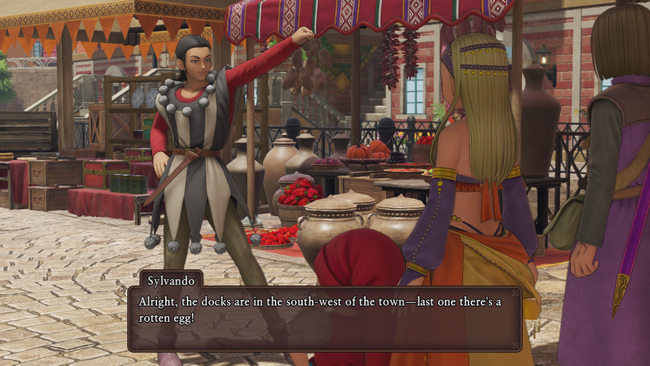
I’ve been playing DQ3 to prepare for this revisit of XI, and it's impressive just how it feels like a modern version of that classic. That game introduced a style for episodic progression that subsequent games have improved and iterated on. Every town you visit has a little story arc where the hero and their party must solve a problem that is plaguing the townsfolk. When you accomplish this, you are given a sense of closure and an idea on where to go next. While some of the storylines themselves ostensibly stand unrelated to each other, they all tie together broader themes throughout the narrative whole. Dragon Quest XI takes this idea and perfects it, creating a series of little arcs that only last around an hour or two each and seamlessly weave from one into the next. The pacing is engaging and makes it nearly impossible to put down.
A Dragon Quest game is nothing without an enthralling world to explore, and this is the best one I’ve seen from the series yet. Dragon Quest VIII was the first game in the series to have a full 3D world to explore, and while it was impressive for a PS2 game, there’s a lack of detail that keeps the game from feeling truly lived in. Dragon Quest IX’s world was in 3D, but returned to the top-down style of the previous games due to the limitations of the DS. Dragon Quest X is still stuck only in Japan, but I’m sure the Wii did the best it could to up the ante in terms of an immersive game world. XI uses all the improvements that come with improved technology to craft a fully detailed world. Every environment feels unique, and they’re all packed with fun little secrets to discover. Rideable monsters can be found that expand your way of exploration, and thanks to the S version you will be able to see your active party follow you around.
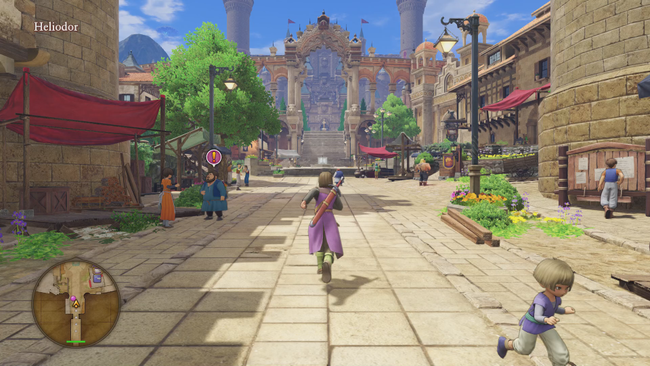
Towns are massive and blow every previous entry away. Reaching Heliodor, the game’s first major city, was the moment I realized I was playing a truly special video game. The streets are full of lively NPCs, giving players hints on where to go and building the world in a natural way. You can spend an hour in this town alone speaking to the townsfolk and looking into every nook & cranny for items and recipes. For the first time in the series, towns can be explored vertically as well. You can climb up on rooftops and even jump down chimneys to enter locked rooms. No two towns are similar, all having little gimmicks that make them stand out.
Dungeons get the same amount of love, feeling great to explore for the same reason the overworld is so enjoyable: The game feels good to play. Running around the winding corridors and caverns to scour for every last chest was enjoyable enough to make every dungeon feel fun. As someone who has played Dragon Quest XI far too many times across all the different versions, the increase in framerate goes a long way in terms of game feel. Even revisiting dungeons in the late game never grew stale because exploration and combat felt so good.
As always, Akira Toriyama’s brilliant monster designs populate the expansive fields. Dragon Quest XI’s combat is not only a love letter to the entire series, but is also “deceptively simple” like the narrative. It takes the best elements of Dragon Quest VIII and IX, which themselves were building on the battle mechanics that have been building up since the first game, and took them even further. There are no random encounters and you are given the chance to attack enemies on the field to give yourself an advantage. You have an active party of up to four characters and you can switch them in and out as you engage in classic turn-based combat. Every character gains experience as long as they survive to the end of the battle, so you are given the freedom to experiment with any party you want.
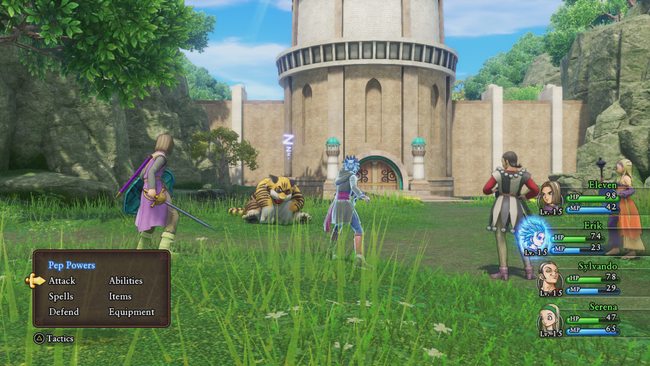
Battles seem very old school and start out simple, but increase in complexity as you go through the game. I’ve seen people disregard the game wholesale because they think the combat looks outdated, and I couldn’t agree less. Dragon Quest games are meant to feel comfortable for all players, with each new game improving the backend while seeming similar to past games. Any player can pick up a Dragon Quest game and enjoy it as long as they give it an open-minded chance. The game stays faithful to the series’ roots but adds enough to make the combat feel better than any other past game.
Gone are the days of picking your party’s actions all at once as you try to predict how things will play out. The game continues in the footsteps of Dragon Quest IX trying to make the combat more action-based and exciting, now having your characters use an ability the second you choose it. This, like with all of the new additions, might not seem like such a big deal. A small change like this however completely changes how battles have been designed, and bosses now require more split-second decision making to keep you on your toes.
A bigger change is the latest evolution on Dragon Quest VIII’s tension system, with the new Pep system. Characters have a chance to go into a “psyched-up” state where their stats are temporarily increased. While in this Pepped state they can unleash one of numerous powerful Pep Powers if one of their friends is also Pepped. Knowing when to go all out with Pep Powers and when to hold back and get extra damage dealt is important to the flow of battle. Since Pep will go away after a few turns, it's important to know that you can bench pepped characters to hold off on their bonuses for when you need them. The “randomness” of this system seems like it could cause annoyance, but I found it added just the right amount of uncertainty to battles.
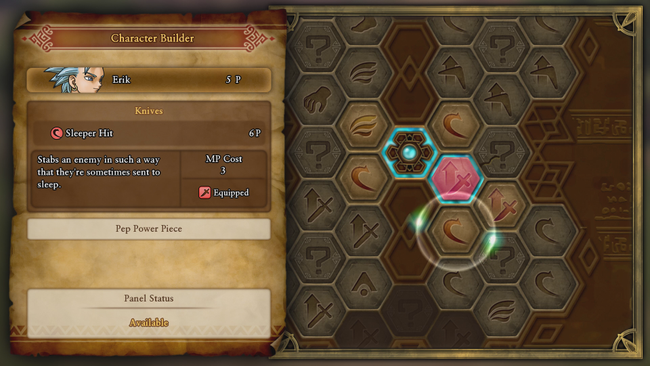
What adds the most depth to the combat system is character building. Each cast member fits a specific RPG Class archetype, but you are given the freedom to build them however you wish. You gain skill points upon leveling up, and spend these in a branching series of panels to teach your characters new abilities. If you’d like your Luminary to focus on Great Swords over the traditional Sword and Shield, you can. The game also incentivizes focusing on multiple branches at once. You can take Erik down the dagger path to unlock dual wielding and keep him there to create the best physical attacker in the game, but you can also unlock dual wielding and then using this with swords and boomerangs. Dragon Quest has never offered this much freedom before, and what ties it all together in a beautiful bow is that you can respec your characters at almost any point if you think you don’t vibe with how a character has been played out. Every playthrough can be entirely different because of this, and it led to a lot of fun conversations with friends on how they built their party.
You don’t just get to build your character’s stats, but also their weapons. Like with many mechanical aspects this game improved, XI takes a core concept from VIII and IX and fleshes it out with a new minigame. The Fun-Sized Forge is an optional feature that takes the Alchemy mechanic and adds some much-needed player input. As you explore and kill monsters you obtain materials which can either be sold for money or used in recipes to make better equipment than you could buy from any shop. You are given a set amount of focus points based on what level your protagonist is, and have to whack away at blocks to try to make the best possible item without running out of points or hitting blocks too much. If for some reason you are missing some materials for a recipe, the fun-sized forge will likely give you the option to purchase them if you have the money. Even in an optional mini-game like this, the developers designed it to respect your time.
Allow me to get a bit real for two paragraphs. I played most of Dragon Quest XI S this year during the start of the pandemic. As it felt like the world was collapsing around me and I was going through some of the hardest times of my life, Dragon Quest was a comfortable constant. The positive and welcoming vibes of running around the overworld consistently put a smile on my face. This is the ultimate feel-good game, with the serious story beats only strengthening the moments of relaxation and vice versa.
Dragon Quest XI is the antithesis of a stressful game, letting you approach it on your own terms and your own pace. The pacing works perfectly for this kind of pick-up-and-play nature. You could come back every night after a long day of work and put in an hour or two before bed or binge it for ten hours a day until you finish, and feel right at home. Every time you boot the game up you’re given a thorough recap of where you last left off, but I felt that the game was so memorable that I instantly remembered anything after months of not playing. This game is a warm cup of cocoa after a long winter day, and I think we need to value experiences like this.
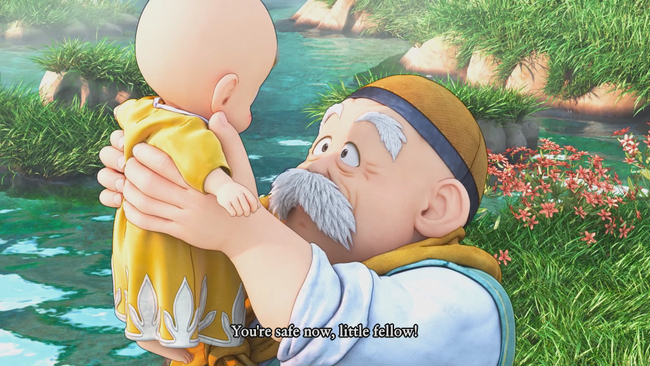
These relaxing vibes are at their pinnacle when it comes to Dragon Quest XI’s side content. Whether it comes to mini-medal collecting, side quests, horse racing, searching for recipes, or obsessing over the casino, there’s something here for everyone. I enjoyed all of the optional aspects of the game, but the one I’d like to highlight is the casinos. I’ll be frank, I dumped what has to be at least 20 hours into slot machines. Have no fear though, there are absolutely no microtransactions. You buy casino tokens with in-game money and can exchange the casino tokens for some of the best equipment in the game. There are numerous casinos with multiple different gambling games, but I got addicted to slot machines. I would bring my adventure to a screeching halt as soon as my party reached the first casino in Puerto Valor, and five hours eroded away in what felt like an instant. I fondly remember grinding battles outside the town just to raise money to instantly spend it on casino tokens. I wish every RPG treated gambling like Dragon Quest does because I’d much rather only waste my time for in-game rewards instead of real-world money.
Dragon Quest XI S is exactly as definitive as the lengthy title implies, with an orchestrated music option that makes the soundtrack leagues better than it did originally with numerous quality of life and content improvements. The only new option that I am unsure about is the game’s 2D presentation mode, which is why I’ve basically spent this review acting like it doesn’t exist. In my eyes, Dragon Quest XI’s identity exists mostly in the fact that it is a modern 3D RPG. 2D was initially made to give the game’s 3DS version an extra gimmick and is essentially a demake. It is meant to call back to the classic 16 bit DQ games in terms of visuals and gameplay. Personally, I find that the 2D mode isn’t nearly as charming in terms of the game’s presentation, with cutscenes that lack voice acting and impact. Town exploration has been reduced significantly, with most of the verticality gone. The combat returns back to the classic style of choosing all of your party’s moves at once. Battles just simply aren’t as exciting in this mode. I hope this doesn’t make it seem that I hate 2D mode, I just strongly recommend against playing the game like this for your first playthrough. This mode works best for a second playthrough to see how different it is, or for series veterans wanting to play a new Dragon Quest game in the classic style. I’m happy the option is there, but it's not for me. The 3D mode is just way too innovative and charming.
It's taken me months to sit on Dragon Quest XI S and articulate just why everything about it worked so well for me. It is as close to a perfect game as you can get in my opinion. It achieves everything it sets out to do, and exceeds expectations around every corner. While it seems trapped in a cage of tradition from the outside, players who dive in will discover a game constantly striving to break conventions. All of the callbacks to past games are not out of cheap nostalgia, but out of a passionate adoration for the franchise.
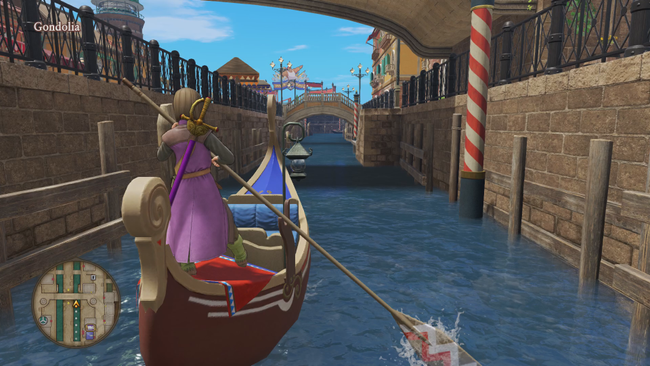
If you've never played a Dragon Quest game before, this is the best introduction to the series you could ask for. If you're a Dragon Quest fan and haven’t played it yet, then you need to get on this. This game made me re-approach how I view not just past Dragon Quest games, but every RPG I play from now on. Dragon Quest XI S is a near unrivaled masterpiece, one I wish I could erase my memory of and re-experience for the first time. Having said that, this second time through has been special in its own way. Going back and playing older Dragon Quest games has only increased my appreciation for it. This final version of the Definitive Edition of one of my favorite RPGs is a great send-off as we await the anticipated release of Dragon Quest XII.
However, allow me to be petty for a moment. As of writing this review, the “Cull” part of my name “Cullen” apparently sets off an offensive word filter, preventing me from naming the Dragon Quest XI protagonist after myself. I have been robbed of the highest level of immersion that is crucial for RPG genre, simply because my name is unconventional. Can you think of a better name that would fit perfectly in a fantasy game than “Cullen”? Well, maybe Clive. Square Enix has been (understandably) too busy to respond to my tweet asking them to patch in an exception to their filter. If I were pettier, I could have knocked the game down to a 9/10, but I guess credit is due to making me care so much about a silent protagonist I named “Eleven”. Well played.